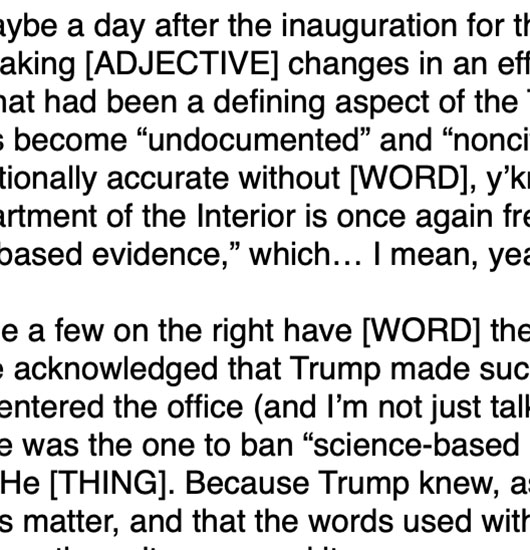
Note: There’s a political bit in here, but you’ll get plenty of warning, if you’re not into that stuff.
I am fairly dedicated to words. I don’t know if this is because I’m a copywriter, a pedant, or a little bit of Column A and a little bit of Column B. I have, on occasion, been accused of splitting hairs, and I’m sorry, maybe those hairs just shouldn’t have been big enough to be split. When Merriam-Webster declared its support for “irregardless,” I lost a little bit of respect for them. For shame, M-W. For shame.
But the reason I’m so dedicated to words is that words really are important. Using accurate words is important to convey the right information, and using the connotatively right words is important to convey the meaning behind the information. Famous and notorious have similar and yet distinctly different meanings. We feel different about people who are tenacious or stubborn. A selective person has high standards, and a picky one is a pain in the ass. Calling a person thin or skinny or scrawny produces very different mental images.
“It’s a matter of semantics” is used dismissively, to indicate that the words in question are inconsequential, but that’s not right. “A matter of semantics” is a big deal, because semantics are, well, what I do for a living, but they’re also the way we live our lives, whether we recognize it or not.
Words matter in advertising.
We choose our words carefully all the time in advertising, sometimes consciously, sometimes not. Without having to think about it, we know to talk about value when we’re working with a product that’s straight-up cheap. Our brand manuals and briefs specifically talk about tone of voice because we know how tone (and, by extension, word choice) can influence an audience’s perception of a brand. Our CDs hammer it home, and when they don’t, our audiences are usually happy to point out our errors.
We know that usually, jargon is to be avoided, because it creates distance between you and your audience and can make them feel stupid. But sometimes, it can be strategically deployed to dazzle them and even make them feel smart. We know that no matter who we’re talking to, it’s important to remain on brand if we don’t want to come across as inauthentic. Or worse. (Put down the AAVE and back away, copywriters who don’t use it on the regular.)
(All this stuff is also something that makes a thesaurus a dangerous tool in the wrong hands. A synonym isn’t always an equivalent swap-out, and that’s even before you start throwing out words like estimable.)
Now, might my repeated use of “We know that” indicate that this isn’t something I really need to write about? Possibly. But you’d be surprised at how many creative professionals at a number of levels get tripped up from time to time. So if you suspect I might be talking to you, I might well be.
Besides, words matter in more than just advertising.
Words matter in life.
How we talk to each other. How we talk to our colleagues. How we talk to our kids. We dissect texts and emails and Slack messages to try to discern a person’s real intent. We slip and say things we didn’t mean to say but can’t really take back because of one poorly chosen word. It’s everywhere.

The rise of women in positions of professional authority (and doesn’t that sound weird to say in 2021?) has drawn attention to the subtleties that have slowed that process. It’s certainly nothing that hasn’t been talked about before, but that doesn’t mean it’s gone away: gender-biased language. A woman might be deemed aggressive for exactly the same actions that would make a man assertive. She’s pushy, he’s decisive. She’s emotional, he’s impassioned. The solution offered is always for women to learn to be more like men in the workplace, to be less emotional, to be less pushy, less aggressive, when the problem is rooted not in the actions but in the perception — and the perception is defined, in large part, by words.
That’s something that’s come home as well. The admittedly hamfisted “Ban Bossy” campaign tried to draw attention to the fact that a little boy might be praised as a leader for the same behavior that would have a girl criticized as bossy. I’m going to go so far as to say that the critical response received was largely because of, well, words. A ban implies censorship, and outside force, and people don’t like that, while the movement was just trying to make people aware of the issue in their own lives. But poor word choice notwithstanding, the aim of the movement was sound. The vocabulary we give to kids is the one they’ll be carrying throughout the rest of their lives, and telling a six-year-old that she’s a shrew — while she watches her boy counterparts receive praise for the same behavior — is not a good way to start.
And of course it isn’t just gender. Some people (a certain kind of people, we might say) roll their eyes at the idea that it’s not good to call a Black person articulate. But words mean something. As Jimi Izrael pointed out on NPR, “It’s one thing to be called eloquent — as in, to master the language — and another to be called articulate — as in merely having the ability to put words into a coherent sentence.” Clean is another one. Bathing regularly and being able to put a sentence together aren’t anything that would be noteworthy for anyone else, and that’s why two little words can make a difference.
Now.
As warned, this does get a wee bit political, so feel free to skip right to the last part if that’s not your thing.
Words matter in politics (a.k.a., The Political Part)
It took maybe a day after the inauguration for the Biden administration to start making lexical changes in an effort to combat the harsh rhetoric that had been a defining aspect of the Trump era. “Illegal alien” has become “undocumented” and “noncitizen,” both of which are definitionally accurate without demonizing, y’know, human people. The Department of the Interior is once again free to use phrases like “science-based evidence,” which… I mean, yeah. Right?
Now, while a few on the right have declared these changes Orwellian, it must be acknowledged that Trump made such changes himself when he entered the office (and I’m not just talking about “alternative facts”). He was the one to ban “science-based evidence” and “climate change.” He banned “vulnerable” and “transgender” at the CDC. Because Trump knew, as so many others do, that words matter, and that the words used within his administration would shape the culture around it.
Stephen Miller, himself the author of some of Trump’s foulest policies and proclamations, himself said, “The struggle over the lexicon is actually the central struggle. Equity is meant to harken to this idea that America is a nation that believes in everybody having this fundamental dignity of treatment. But the other side would say, ‘What you call equity, I call discrimination.’” He, in essence, pits fundamental dignity of treatment against the other side’s sense of discrimination, as if the one should be sacrificed in service of the other, and… I mean, fundamental dignity? As a rhetorical poker chip in the political game?
And that’s why words matter, and specifically, the words used by the Biden administration matter. If the other side — “other side” — perceives fundamental respect for human dignity as a personal slight, that clues us in on something that needs to be worked on.
That’s the end of the political part, I swear.
Words matter to me.
I have (among other things) three words written on the whiteboard above my desk: exploit, mercenary, and rationalize. That’s because those words have very specific meanings — sometimes “take advantage of” doesn’t get the job done — and for some reason, I can never find them when I need them. (Do I need them often? More frequently than you’d think.) And it bugs the crap out of me.
(I’ve written before, in fact, about my tendency to just throw up my hands and write [ADJECTIVE] in my copy when I get stuck for a word, and then go back and pick it up later. That’s because that can’t be just any old adjective — it has to be the right adjective, and I’m going to give it the time it’s owed.)
Also, my own words matter to me. I’ve basically devoted my career to finding the best words for other people, in their voices, and that makes it all the more important that when I write for myself, it’s me. It’s not, like, self-consciously me, because that would negate the purpose of it being me. But it’s me, writing the way I need to and carefully selecting the words I want to use because, y’all, words matter.
(Also, I only cuss because I’m super intelligent, creative, and honest, so there. YOU’RE WELCOME, ADVERTISING INDUSTRY.)

